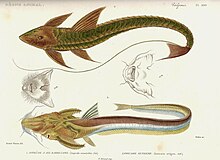Aspredo aspredo is the only species of banjo catfish (order Siluriformes) in the genus Aspredo.[2]
| Aspredo | |
|---|---|

| |
| Scientific classification | |
| Domain: | Eukaryota |
| Kingdom: | Animalia |
| Phylum: | Chordata |
| Class: | Actinopterygii |
| Order: | Siluriformes |
| Family: | Aspredinidae |
| Subfamily: | Aspredininae |
| Genus: | Aspredo Scopoli, 1777 |
| Species: | A. aspredo
|
| Binomial name | |
| Aspredo aspredo | |
| Synonyms | |
| |
This species originates from the lower portions of rivers from Venezuela to northern Brazil.[2] It occurs in the Orinoco delta, through the Guianas, to the Amazon River to the island of Trinidad.[3]
A. aspredo is the largest species of aspredinid, reaching about 38.3 centimetres (15.1 in) SL.[4][5] The maxillary barbels are attached to the head, the colouration is uniform without any pattern of dark saddles, and the unculiferous tubercles present in other aspredinids are highly reduced.[3]
A. aspredo is a benthic fish that is found on sandy-muddy bottoms in turbid waters in coastal river mouths where it can be found in brackish waters.[5] However, it appears to enter further into fresh water than its relatives.[3] This species practices an unusual method of incubation of the eggs, attaching them to the underside of the female who then carries them around. Reproduction is believed to occur in the early part of the year.[5]
References
edit- ^ Frederico, R.G. "Aspredo aspredo. The IUCN Red List of Threatened Species 2021".
- ^ a b Ferraris, Carl J. Jr. (2007). "Checklist of catfishes, recent and fossil (Osteichthyes: Siluriformes), and catalogue of siluriform primary types" (PDF). Zootaxa. 1418: 1–628. doi:10.11646/zootaxa.1418.1.1.
- ^ a b c Friel, John P (2000-04-14). "Aspredo. Aspredo aspredo (Linnaeus, 1758)". Tree of Life Web Project. Retrieved 2007-08-07.
- ^ Nelson, Joseph S. (2006). Fishes of the World. John Wiley & Sons, Inc. ISBN 0-471-25031-7.
- ^ a b c Froese, Rainer; Pauly, Daniel (eds.). "Aspredo aspredo". FishBase. December 2011 version.
